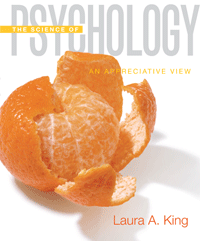| acquisition (classical conditioning) | The initial learning of the stimulus–response link, which involves a neutral stimulus being associated with an unconditioned stimulus and becoming the conditioned stimulus that elicits the conditioned response.
|
 |
 |
 |
| applied behavior analysis (behavior modification) | The application of operant conditioning principles to change human behavior.
|
 |
 |
 |
| associative learning | Learning in which a connection, or an association, is made between two events.
|
 |
 |
 |
| behaviorism | A theory of learning that focuses solely on observable behaviors, discounting the importance of such mental activity as thinking, wishing, and hoping.
|
 |
 |
 |
| classical conditioning | Learning by which a neutral stimulus becomes associated with a meaningful stimulus and acquires the capacity to elicit a similar response.
|
 |
 |
 |
| conditioned response (CR) | The learned response to the conditioned stimulus that occurs after the pairing of a conditioned stimulus and an unconditioned stimulus.
|
 |
 |
 |
| conditioned stimulus (CS) | A previously neutral stimulus that eventually elicits the conditioned response after being associated with the unconditioned stimulus.
|
 |
 |
 |
| counterconditioning | A classical conditioning procedure for weakening a conditioned response by associating the fear-provoking stimulus with a new response that is incompatible with the fear.
|
 |
 |
 |
| discrimination (classical conditioning) | The process of learning to respond to certain stimuli and not to others.
|
 |
 |
 |
| discrimination (operant conditioning) | The tendency to respond to stimuli that signal that a behavior will or will not be reinforced.
|
 |
 |
 |
| extinction (classical conditioning) | The weakening of the conditioned response in the absence of the unconditioned stimulus.
|
 |
 |
 |
| extinction (operant conditioning) | The situation where, because a previously reinforced behavior is no longer reinforced, there is a decreased tendency to perform the behavior.
|
 |
 |
 |
| generalization (classical conditioning) | The tendency of a new stimulus that is similar to the original conditioned stimulus to elicit a response that is similar to the conditioned response.
|
 |
 |
 |
| generalization (operant conditioning) | The tendency to give the same response to similar stimuli.
|
 |
 |
 |
| insight learning | A form of problem solving in which the organism develops a sudden insight into or understanding of the problem's solution.
|
 |
 |
 |
| instinctive drift | The tendency of animals to revert to instinctive behavior that interferes with learning.
|
 |
 |
 |
| latent learning (implicit learning) | Unreinforced learning that is not immediately reflected in behavior
|
 |
 |
 |
| law of effect | Thorndike's principle that behaviors followed by positive outcomes are strengthened, whereas behaviors followed by negative outcomes are weakened.
|
 |
 |
 |
| learned helplessness | The phenomenon of learning through experience that outcomes are not controllable.
|
 |
 |
 |
| learning | A relatively permanent change in behavior that occurs through experience.
|
 |
 |
 |
| negative punishment | A behavior decreases when a positive stimulus is removed from it.
|
 |
 |
 |
| negative reinforcement | Following a behavior with the removal of an aversive (unpleasant) stimulus to increase the frequency of the behavior.
|
 |
 |
 |
| observational learning | Learning that occurs when a person observes and imitates another's behavior; also called imitation or modeling.
|
 |
 |
 |
| operant conditioning | Also called instrumental conditioning; a form of learning
|
 |
 |
 |
| positive punishment | A behavior decreases when it is followed by an unpleasant stimulus.
|
 |
 |
 |
| positive reinforcement | Following a behavior with a rewarding stimulus to increase the frequency of the behavior.
|
 |
 |
 |
| preparedness | The species-specific biological predisposition to learn in certain ways but not others.
|
 |
 |
 |
| primary reinforcement | The use of reinforcers that are innately satisfying.
|
 |
 |
 |
| punishment | A consequence that decreases the likelihood a behavior will occur.
|
 |
 |
 |
| reinforcement | The process by which a stimulus or an event strengthens or increases the probability of a behavior or an event that it follows.
|
 |
 |
 |
| schedules of reinforcement | Timetables that determine when a behavior will be reinforced.
|
 |
 |
 |
| secondary reinforcemenT | The use of reinforcers that are learned or conditioned.
|
 |
 |
 |
| shaping | Rewarding approximations of a desired behavior.
|
 |
 |
 |
| spontaneous recovery | The process in classical conditioning by which a conditioned response can recur after a time delay without further conditioning.
|
 |
 |
 |
| unconditioned response (UCR) | An unlearned response that is automatically elicited by an unconditioned stimulus.
|
 |
 |
 |
| unconditioned stimulus (UCS) | A stimulus that produces a response without prior learning.
|





